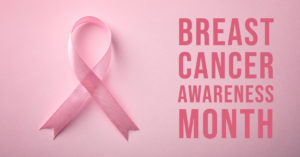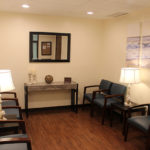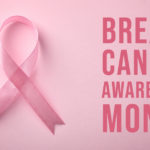
October is Breast Cancer Awareness Month and an essential time to highlight the importance of early breast cancer detection. With one out of eight women experiencing breast cancer at some point in their lives, early detection is key to ensuring successful treatment and recovery. Regular visits to your ob-gyn for breast exams and mammograms are important; however, you can take steps at home each month to detect breast cancer.
How to Perform a Self-Breast Exam
Self-examinations should begin as early as the teenage years, but by age 20, women should be performing self-breast exams on a regular basis. They take only a few minutes and should especially be performed one week after the start of your period. The first part of a self-exam should be done in front of a mirror. Check the appearance of your breast from multiple angles and note any changes in breast size or shape. Notice if the texture of your skin looks irritated, dimpled, or retracted. The nipples should be checked for fluid discharge. They may also be turned inward or enlarged.
The second part of the exam can be done standing or lying down. You can start with your right breast by raising your right arm and placing your hand behind your head. With your left hand, feel your breast with the tips of your three middle fingers. Search for signs of lumps or masses. These should feel very firm and are usually painless. Squeeze the nipple with your finger and thumb to see if discharge appears. After this, perform the test again on the left breast, reversing the hands you used for the right side.
If you have detected any of the symptoms described above, alert your gynecologist in Tarzana, CA as soon as possible for a clinical exam.

Absolutely. Regular breast exams increase your chances of detecting cancer in the early stages when it is most treatable. An estimated 1 out of 8 women will be diagnosed with breast cancer at some point in their lives. There are three common breast exams that provide the most successful detection.
Self-Exams
Self-examinations should begin as early as the teenage years, but by age 20, women should be performing self-breast exams on a regular basis. They take only a few minutes and should especially be performed one week after the start of your period. The first part of a self-exam should be done in front of a mirror. Check the appearance of your breast from multiple angles and note any changes in breast size or shape. Notice if the texture of your skin looks irritated, dimpled, or retracted.
Clinical Exams
Clinical breast examinations are performed in Dr. Ayalon’s office. Before the exam begins, you should let Dr. Ayalon know about any changes you’ve noticed in your breasts and share your concerns and questions. Dr. Ayalon will address your concerns, answer your questions, and use any information you provide to help find and identify symptoms of breast cancer.
Mammograms
Mammograms are X-rays that are used to identify masses or tumors in the breasts. In this procedure, you will have your breast placed between two plates. The plates compress your breast to get the clearest image possible. This is known to cause discomfort, but will only last for a short moment while the picture is taken. Mammograms can tell if a tumor is present, but not whether it is cancerous or not.
Regular breast exams can ensure your health and give you peace of mind. Every woman should make it a priority not only to monthly self-examinations but also annual clinical exams with their OBGYN in Tarzana, CA. You can schedule your routine exam by contacting our office at (818) 654-9312.






